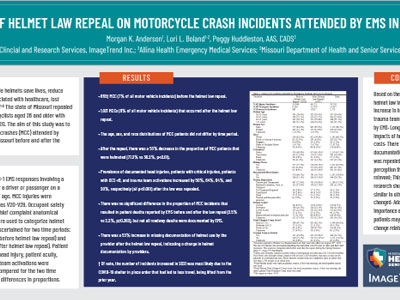ABSTRACTS
Impact of Helmet Law Repeal on Motorcycle Crash Incidents Attended by EMS in MissouriAuthor: Morgan Anderson, MPH | | Associate Authors: Lori L. Boland, MPH, Peggy Huddleston, AAS, CADS
Introduction Previous research has shown motorcycle helmets save lives, reduce serious injuries, and reduce health-related costs. Missouri repealed its helmet use law for motorcyclists ≥ 26 years with health insurance on August 28, 2020. Objective To compare characteristics of motorcycle crashes (MCC) attended by emergency medical services (EMS) in Missouri before and after the helmet law repeal (HLR). Methods All 9-1-1 EMS responses involving a MCC injury where the patient was ≥ 26 years were included. MCC injuries were identified using ICD-10 Codes V20–V29. Occupant safety equipment use, provider impressions, chief complaint anatomical location, and patient care narratives were used to categorize helmet use and head injuries. Incidents were ascertained for two time periods: March 1 through August 27, 2020 (before HLR) and March 1 through August 27, 2021 (after HLR). Patient demographics, urbanicity, helmet use, head injury, patient acuity, Glasgow Coma Score (GCS) and trauma team activations were examined. Categorical variables were compared for the two time periods with chi-square tests to assess differences in proportions. Results A total of 682 MCC (7% of all motor vehicle incidents) occurred before the HLR and 1,031 MCCs (8% of all motor vehicle) occurred after the HLR. The age, sex, and race distributions of MCC patients did not differ by time period. After the repeal, there was a 53% decrease in the proportion of MCC patients that were helmeted (77.3% vs. 36.2%, p < 0.01). Documented head injuries, critical injuries, patients with GCS < 8, and trauma team activations increased by 50%, 64%, 64%, and 20%, respectively (all p < 0.001) after the HLR. Unknown helmet use documentation by provider also increased (9% vs. 14%, p < 0.01). Conclusion Based on these results, the HLR is associated with an increase in head injuries, injury severity, and trauma team activations among MCC patients attended to by EMS. Longer-term monitoring is necessary to track the impacts of helmet use in MCCs on EMS resources and costs. There was also a decrease in helmet use documentation by EMS providers after the HLR, indicating the perception that helmet use documentation is no longer relevant.
|

